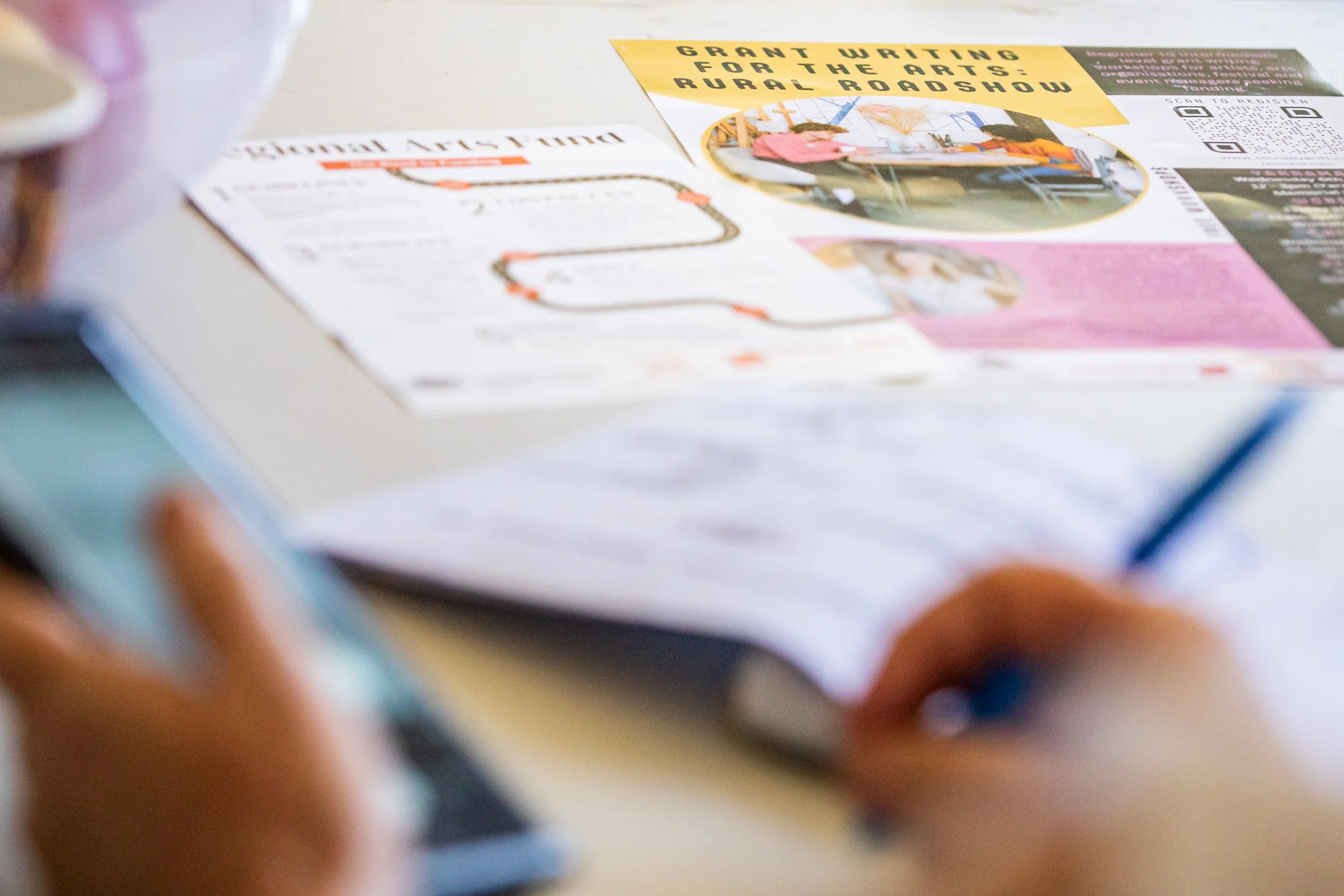10 Tips for Top Grants
Did you know that for the typical grant seeker in Australia, 62% don’t submit their grant application after they start one*? To ensure regional Queensland can beat these odds, I’ve put together a comprehensive, 3-hour grant writing master class for artists, arts organisations and creative businesses in regional Queensland seeking to build their grant writing confidence and skills.
Grant Writing for the Arts Workshops
With thanks to funding from the Regional Arts Fund, I’m officially halfway through the Grant Writing for the Arts: Rural Roadshow project - six workshops in six Queensland communities sharing tips and tricks for writing successful grants in the arts and cultural sector. Due to funding support, these workshops are fully-subsidised for participants to attend (that’s right - they’re free!). There are 3 more workshops to go in the Sunshine Coast, Gympie and Fraser Coast regions:
Kenilworth: Thursday 18 April 11am-2pm
Tin Can Bay: Wednesday 24 April 11am-2pm
Tiaro: Wednesday 1 May 11am-2pm
Olivia Everitt facilitating the ‘Grant Writing for the Arts’ workshop at Wondai Regional Art Gallery (South Burnett region) in March 2024.
10 Tips for Top Grants
As part of this workshop series, I’ve developed a new, one-page resource sheet - 10 Tips for Top Grants! Whether you’ve a beginner grant writer or a seasoned pro, this resource is your secret weapon to strengthen your next grant application.
If you’d like a printable copy to keep on your desk, I have you covered!
Remember, grant writing is a transferrable skill, so whether you’re looking for grants in the arts sector, small business grants, infrastructure grants or something else, these tips apply to you!
Grant Writing Tip #1: Do Your Homework
Read the grant guidelines, call the funding body to ask questions and discuss your project, and attend any information sessions.
Unfortunately, no two grant programs are the same! Grant programs that run multiple rounds can also make minor or even major changes from round to round. You will need to read the grant guidelines (and any other associated documents, e.g. FAQs, applicant checklists, budget templates, etc.) in full.
Information sessions are a valuable opportunity to meet representatives from the funding body and ask general questions. These may be face-to-face sessions for local grants, or a webinar format for programs with a broader geographical reach.
For some grant programs it may be mandatory to discuss your project with a representative from the funding body before progressing to an application. Regardless of whether or not this is required, it’s good practice to pick up the phone - grant officers are a wealth of valuable information for any grant seeker!
Grant Writing Tip #2: Is The Grant Right For You?
Understand the context, such as relevant government strategies or the funding body’s mission. Can you find case studies or a previous recipient list to understand what and who has been funded in the past?
Many funding bodies have publicly accessible lists of previous grant recipients, or may offer written or video case studies of previously funded projects. This can be useful research for grant seekers before deciding to proceed with an application.
For government grants, you should also understand the policy environment and strategic context for the grant program. For example, if you’re apply for arts funding from the Australian Government (e.g. Office for the Arts, Creative Australia), it may be useful to understand the key strategic pillars in the new National Cultural Policy—Revive: a place for every story, a story for every place and think about how your project aligns with one or more aspects of this framework.
Grant Writing Tip #3: Is It Attainable?
What was the success rate of previous applicants? Writing a grant application is time intensive, and comparing success rates between grant opportunities can be a useful guide if you have limited time and resources for submitting grant applications.
Some funding bodies will make information about success rates publicly accessible (and others will tell you if you ask - see Grant Writing Tip #1, and pick up the phone!). This intel can form part of your decision-making process on whether or not to progress with an application. If you are applying to round 3, round 6 or even round 120 - understanding how ‘over-subscribed’ (i.e. highly competitive, low success rate) or ‘under-subscribed’ (i.e. less applications than expected, high success rate) the grant program can be useful for grant seekers.
If you have the time and resources to apply for funding and you believe your project strongly aligns with the funding objectives, I would always recommend you apply and throw your hat in the ring.
However, many organisations have limited time and/or people power and may only be able to target a small number of grants each year. Understanding success rates may be a strategic tool to add to your grant seeking tool kit.
Grant Writing Tip #4: Tackle Your Budget Early.
A strong and viable budget is important for funding bodies, but it’s equally as important to you! Poorly costed budgets are risky. Many grant programs will require quotes and/or reference to industry rates. For large projects or infrastructure grants, ask the funding body if you can include a contingency in your budget for price escalation or unexpected changes.
Budgets can be (and arguably, should be) complex. Some funding bodies may require you to supply quotes for large budget items. For infrastructure projects, this may be 2-3 comparable quotes.
Creating your budget may require liaising with external stakeholders, trades and suppliers to obtain quotes. Don’t leave this until the last minute!
Olivia Everitt facilitating the ‘Grant Writing for the Arts’ workshop at The Platform, Murgon (South Burnett region) in February 2023.
Grant Writing Tip #5: Don’t Leave Support Material Until Last.
From letters of support to financial documents, many grant applications require additional attachments. Allow time to engage with external stakeholders and gather the required information.
Handy documents to have on hand before looking for grants include:
Insurance Certificate of Currency (many grant applications will require evidence of your Public Liability Insurance, particularly if there is any public-facing outcome like an event).
Incorporation Certificate (relevant for community groups and clubs with an Incorporated Association structure).
Most recent audited financials (particularly relevant for not-for-profit grant seekers, and charities registered with the Australian Charities and Not-For-Profits Commission (ACNC).
Examples of previous work (do you have high quality images, video or audio of your creative practice? Keep a folder of “hero images” handy as many arts grants will ask you to provide evidence of the quality of your practice).
Grant Writing Tip #6: Don’t Be Afraid To Use Dot Points.
Where relevant, capture some of your written responses in dot point form.
Dot points are a simple but useful tool that enable you to:
Double check if you’ve really answered the question.
Avoid lengthy, large blocks of text that lose your key messages.
Provide clarity to the grant assessor about what you’re doing and why.
Grant Writing Tip #7: Prove It.
Provide relevant data to support any claims you make, and to evidence the need for your project. This may include researching and referencing demographic information, tourism data, customer surveys or feedback, ticketing data and more.
For example, instead of writing “The Festival has direct economic benefits for the Fraser Coast region.”, try expanding this and provide relevant evidence:
“The Festival was attended by 4,000 people in 2022 with 700 camping overnight. The average overnight tripper to the Fraser Coast spends on average $141.70/night (1), indicating Festival campers alone injected $99,190 into the local economy.” (Ref 1: Fraser Coast Regional Events Strategy 2020-2024, page 9).
Grant Writing Tip #8: Convey All Key Details To The Grant Assessor.
Have you clearly outlined the why, what, how, who, when and where of your project? Don’t rely on the grant assessor doing extra research outside of your grant application - if it’s important, capture it.
If you are applying to State and/or Australian Government programs, this may include providing basic context such as explaining your geographical location or an overview of the history and impact of your organisation.
Grant Writing Tip #9: Focus On Project Benefits And Impact.
Align the key benefits of your project to the objectives of the grant program (you can find these in the grant guidelines). Have you clearly described the short-term, medium-term and legacy outcomes of your project?
See Tip 6 to tackle this one! Utilising dot points to break down the key benefits or outcomes of your project can help convey this succinctly.
Grant Writing Tip #10: Phone A Friend.
Ask a colleague or friend to read your application before you hit ‘submit’. Give them 10-15 minutes to understand the project and key outcomes. Listen to their feedback and if needed, revisit your application if they’re identified areas that are unclear, or confusing.
Do you have someone in your network you can lean on for an extra set of (objective) eyes? Tap a friend, family member or peer on the shoulder to help with Tip 10!
Did you find this guide useful? Do you have any tips to add? Do you have other questions about grants?
Let me know in the comments section below! Thank you for your support.
*Grants in Australia report (2018), page 16.







